Novak on the future of Tatneft: ‘Out of 10 billion tonnes, 3.5 billion extracted — a new era ahead’
The Russian Deputy Prime Minister sees prospects on the horizon at the Romashkinskoye field and raises “serious” questions
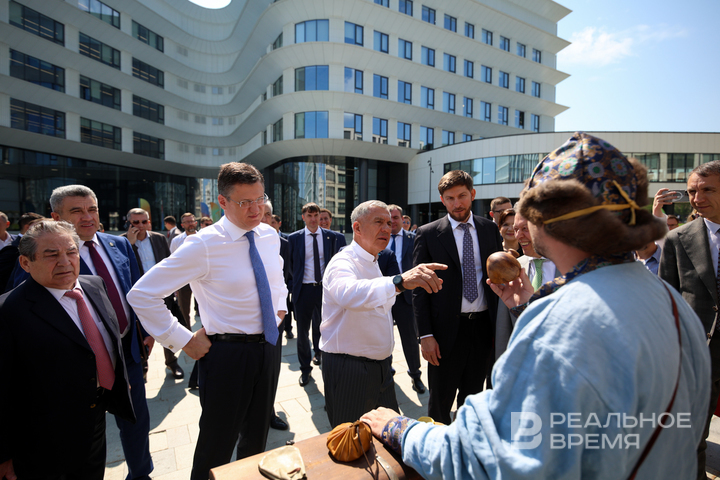
“Previously, we had a 15-year strategy, but today we are looking 25 years ahead. In this timeframe, Russia will remain among the top three countries in the global energy resource market,” outlined Russian Deputy Prime Minister Alexander Novak at the oil summit in Almetyevsk. This time, the event marked the 75th anniversary of Tatneft, but even before tough sanctions and environmental restrictions, the oil company had already transformed into Tatneft+. The main risk is a shortage of qualified specialists, although the Higher School of Oil has secured an export contract with RusVietsovpetro related to oil development in the South China Sea. “If I were to go back to school, I would study chemistry and foreign languages more deeply,” Rustam Minnikhanov advised young people aspiring to succeed in business and technology.
Oil drones, fiberglass pumpjack, and replacement of Finnish tires
The VI Oil Summit took place in Almetyevsk, gathering the chief architects of Russia’s updated energy strategy through 2050, adopted in April. Despite the scorching 35-degree heat, Russian Deputy Prime Minister Alexander Novak and his team spent almost the entire day across various venues: closed-door business meetings were held with the leadership of Tatneft and Tatenergo, while open discussions took place at the oil summit with student youth from different regions of the country and abroad. Joining him in Almetyevsk was Presidential Aide Ruslan Said-Khusainovich Edelgeriev, and from Tatneft’s longstanding partners, Aschat Khasenov, chairman of the Board of KazMunayGas JSC, was also present. The forum was held at the campus of the Higher School of Oil — an original architectural structure built just a year ago.
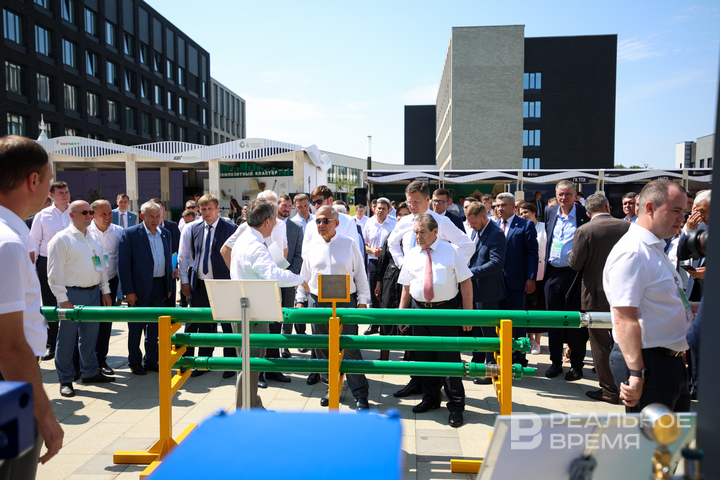
Next to the campus, at an exhibition, Moscow guests were shown an improvised history of oil production in Tatarstan, new developments in premium winter tires from Ikon, a fiberglass installation, and drones for monitoring Tatneft’s fields. “Is it worth replacing reliable Finnish tires?” the guests inquired. “It’s import substitution,” the tire specialists responded. The plant in Vsevolozhsk offers a total of 40 types of tires in its range.
Resident of Innopolis, Rusdronport, demonstrated new software for oil drones. “Here, we are replacing the operator because most of their time is spent inspecting the fields. Currently, the software is being tested — it will include pre-programmed routes for the operator. The drone is Chinese, from DJI. The hardware itself won’t fly autonomously,” company representatives explained. Since last year, Tatneft-Dobycha has created a drone fleet. They fly inspection routes lasting about 40 minutes before returning for recharging. Developers are now improving the software. Why? “Inspection routes change, so it’s necessary to quickly update flight coordinates. The flight radius is about 5 km,” they said.
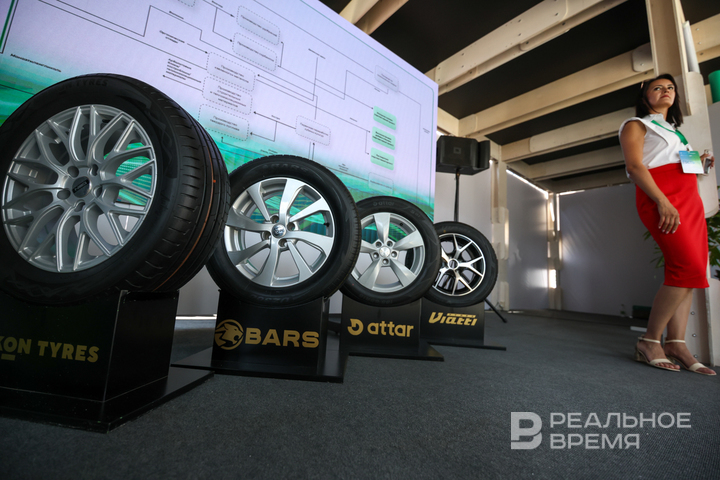
The overarching theme of the discussion was the place and role of Tatarstan’s energy sector in the country’s new strategy, developed in light of the changing geopolitical situation worldwide. No matter how you look at it, Tatneft’s 75th anniversary, coinciding with the adoption of the main strategic document, compels a reassessment of the company’s course. Currently, it ranks sixth in the country in terms of oil production, with an output of 27.28 million tonnes. What are the horizons toward 2050? What growth dynamics are planned by that milestone, given the global shift toward renewable energy, hydrogen generation, and other sources of “green” fuel?
Russian Deputy Prime Minister Alexander Novak stated that hydrocarbon production remains a priority over other types of energy resources. He noted that global energy consumption is expected to increase by 20% by 2050.
“Despite the active development of renewable energy sources — hydrogen technologies, nuclear power — hydrocarbon resources will still hold a leading position,” the deputy prime minister said confidently, adding that the authorities see great potential in developing the oil industry.
The catch is that profitable production has so far been ensured by Western oil service companies. With their withdrawal, the task arose to replace more than 2,000 types of critically important equipment. “Currently, 220 types remain across seven areas, and this issue must be resolved by 2027,” Alexander Novak clarified later.
3.5 billion tonnes is not all that can be extracted from the Romashkino field
Speaking about Tatneft, Novak acknowledged that Tatarstan’s oil workers supported the Soviet economy. They have extracted 3.5 billion tonnes since the development of the Romashkino field began in 1948. However, he quickly added a caveat. “Although I was told that the history [of Tatar oil] dates back to the 16th century, which surprised me. Of course, it was not used for internal combustion engines back then,” he smiled. During the day at the exhibition, Novak was shown a historic document from 1568, an excerpt from the census books of Kazan, which states that “oil is being tapped in the yard.”
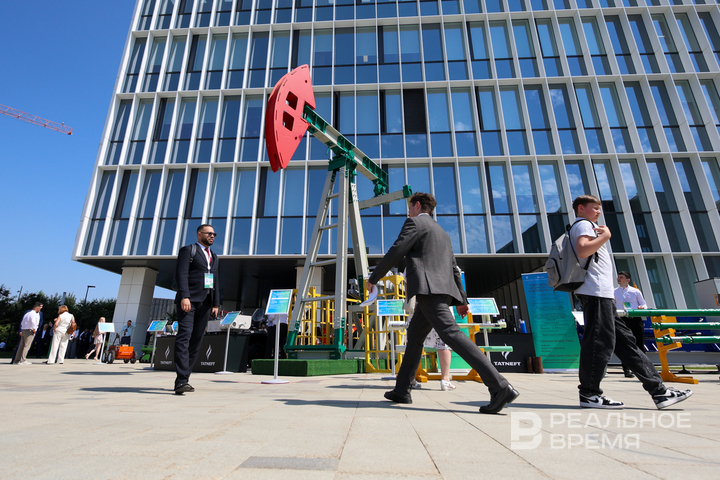
Returning to the present, he recalled that in the 1950s the republic was the leader in oil production in Russia, and in the 1960s it accounted for one third of the country’s output. “But this year we ‘jumped’ to 500 million tonnes, so Tatneft’s share in the country’s total oil production has noticeably declined,” he said. Despite the venerable age of the field, the Deputy Prime Minister sees potential for continued production there. “Out of 10 billion tonnes, 3.5 billion have been extracted. A new era lies ahead, but it cannot be done without modern technologies,” he noted.
Not just extracting oil
At that moment, CEO Nail Maganov was invited to outline the future image of Tatneft. “Not just ‘Tatneft,’ but ‘Tatneft Plus’!” the summit moderator Sergey Brilev clarified, hinting at Tatneft’s diversification. This includes oil refining, tire manufacturing, and pipes. “Our task is to increase the value and worth of the company for the republic and the country,” Maganov explained. Yet, the company’s DNA will remain unchanged.
“We want to remain an energy company,” he said. “But today, it’s not just about extracting oil. It requires immense scientific expertise. Imagine if, with a foundation of 50,000 drilled wells, we stopped development and left 30% of the reserves untapped.”
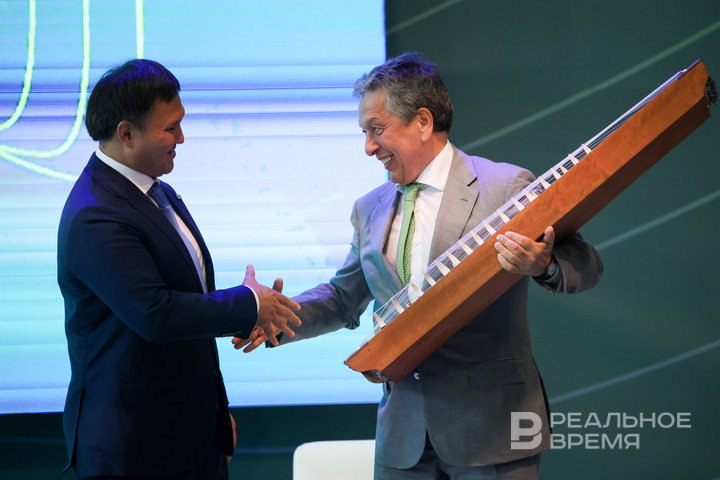
At the same time, Tatneft shares its expertise in geological exploration and oil production with Kazakh companies. Chairman of the Board of NC KazMunayGas JSC, Askhat Khasenov, said that together with the Tatarstan oil workers, they are drilling a well in the Pre-Caspian Basin, while the company itself invests huge resources in geological exploration. This is priority number one. He noted that an atlas covering 15 sedimentary basins with reserves of 76 billion tonnes has been compiled. However, exploration is currently underway in only five of them, and the oil recovery factor stands at 40%. Kazakh oil producers expect to increase oil recovery rates in cooperation with Tatneft.
Development in the South China Sea
Another export direction could be Vietnam. As Alexander Dyakonov, rector of the Higher School of Oil, told Realnoe Vremya, a contract was signed last week with a Vietnamese company for the development of a field in the South China Sea, which borders Vietnam. Most likely, this concerns a contract with the joint venture RusVietsovpetro, which conducts oil production together with Zarubezhneft. This year, the country’s president ratified intergovernmental agreements with Vietnam.
Of course, the Higher School of Oil cannot provide operational support for the contract but will offer services for chemical analysis of core samples and production tests. It is worth noting that offshore oil production technologies are considered the most expensive. This is an important acquisition for the university, as until now the well-known Moscow university, Gubkin Russian State University of Oil and Gas, had been working with the Zarubezhneft joint venture on the Vietnamese project. Incidentally, Kazan Federal University continues its cooperation with KazMunayGas, said Danis Nurgaliev, head of the Institute of Oil and Gas Technologies.

“Today, oil workers find themselves at a point where high technologies determine the viability of the industry. Scientific research and innovative developments in oil extraction are the primary tasks for any company," believes Alexander Dyakonov. “On the other hand, there are constant constraints — environmental requirements and economic sanctions. This forces the oil industry to move faster towards advanced technologies and the training of specialists who will have to implement new solutions.”
What is missing in the domestic fuel and energy sector?
The main risk to implementing the updated strategy is a shortage of qualified personnel. This was the conclusion reached by 38% of respondents during an interactive poll at the summit. Another 21% of attendees believed that the strategy could be hindered by an increase in unjust unilateral sanctions against the fuel and energy sector and related industries. Only 17% of respondents were confident that a lack of funding could be an obstacle. Changes in price conditions and environmental requirements were found to have the least impact on the viability of oil companies, according to the poll conducted in the hall.
The migration of young people from Almetyevsk has stopped, as there is now an opportunity to study at the Higher School of Oil, young people claim. “The most important thing is that we must support students. After graduating, they should not leave," said Rustam Minnikhanov.
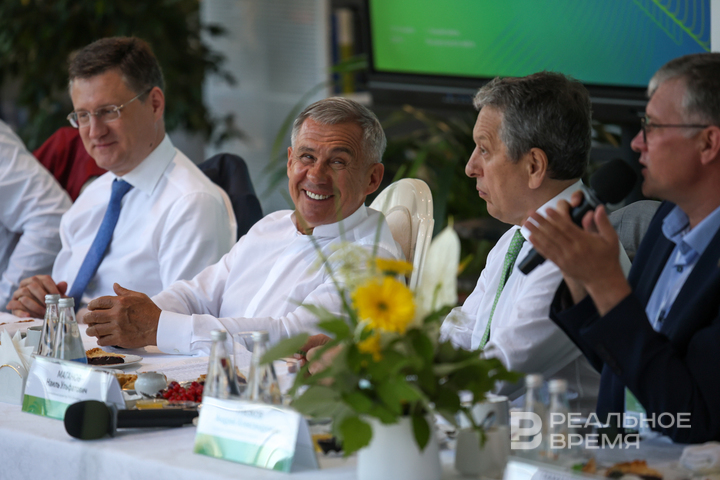
“Which is better — IT technologies or the fuel and energy sector?” was a question previously posed to the rais (head of the region) during a meeting with schoolchildren who won the competition.
“The world is changing so fast that it’s hard to predict. In the past, education ended after university, but today you need to keep up with digital technologies. Every three years, you need to retrain — the world will change dramatically. Each of you might be thinking — I don’t need these subjects. But if I were to go back to school, I would study chemistry and foreign languages more deeply. These are two of my missed opportunities. My advice: knowledge of mathematics, physics, chemistry, and biology will help you stay competitive,” he replied.
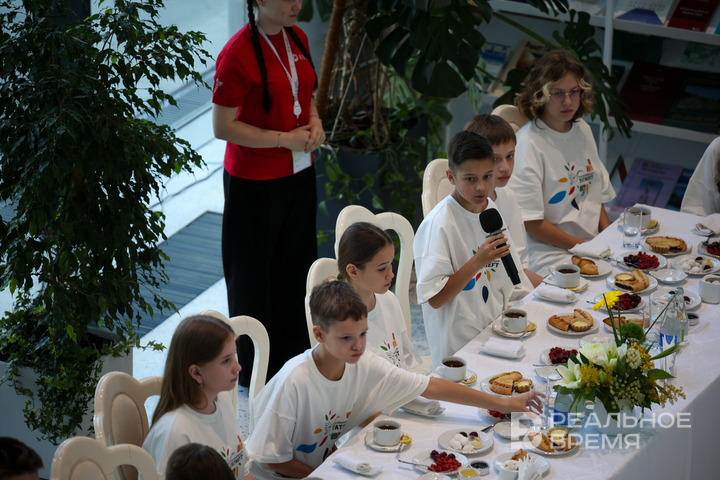
He added that the Higher School of Oil was built in Almetyevsk, not in Kazan or Moscow, so that Tatneft would have a steady supply of skilled personnel. Other children asked a host of global questions about climate and the environment, leaving the deputy prime minister puzzled as to where these “not-so-childish” questions came from. “The future of the Earth is in the hands of the young,” a spirited girl responded loudly. “That phrase is right, but what about closer to home? Do you have lessons like that at school? How did you come to this at such a young age, when not all adults understand?” Novak kept expressing his amazement. Meanwhile, the assistant to the president of Russia, Ruslan Said-Khusainovich Edelgeriev, promised to include them in the Russian delegation to the international conference on the global climate.